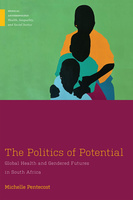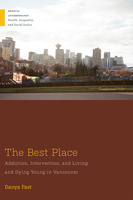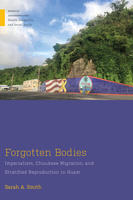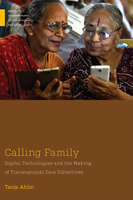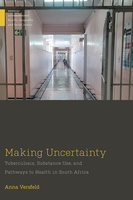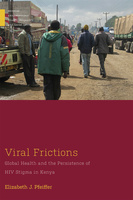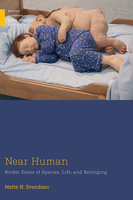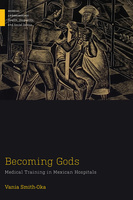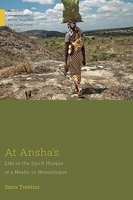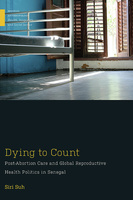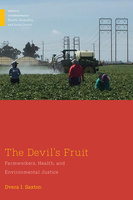Showing 1-15 of 27 items.
Connective Tissue
Factory Accidents and Reconstructive Plastic Surgery in South India
Rutgers University Press
An ethnography of factory accidents and their attendant reconstructive plastic surgeries in Coimbatore, Tamil Nadu, Connective Tissue explores notions of risk, work and labor practices, and the way meaning is made from experiences of trauma, care, and recovery. The book charts a chronology of the accident and its future impacts.
The Negotiation of Urgency
Economies of Attention in an Italian Emergency Room
Rutgers University Press
The Negotiation of Urgency ethnographically explores the everyday life of an Italian ER, where aging, economic precarity, draconian migration policies, hospital overcrowding, life and death, intersect daily. The analysis of the different, shifting ways in which triage operates and attention circulates in the ER illuminates the practical effects of the changing nature of welfare state in Italy, as elsewhere.
The Politics of Potential
Global Health and Gendered Futures in South Africa
Rutgers University Press
In The Politics of Potential, physician-anthropologist Michelle Pentecost investigates The First 1000 Days, an early life intervention project that seeks to end child malnutrition in South Africa, the ways in which this program has been adopted, and how it impacts child-bearing women in South Africa in powerfully gendered and racialized ways.
The Best Place
Addiction, Intervention, and Living and Dying Young in Vancouver
By Danya Fast
Rutgers University Press
The Best Place examines how overlapping housing, mental-health-and-addictions, and overdose crises, alongside their accompanying public health interventions, and the frenetic pace of urban renewal have shaped forms of life and death among young people who use drugs in the city of Vancouver, Canada.
Forgotten Bodies
Imperialism, Chuukese Migration, and Stratified Reproduction in Guam
Rutgers University Press
Women from Chuuk, Federated States of Micronesia move to Guam, U.S. for several reasons, including access to better healthcare. Yet, they suffer disproportionately poor reproductive health outcomes in Guam. Forgotten Bodies illuminates how benign neglect, imperial citizenship, transnational migration, and gender inequities intersect, cohere, and compound to stratify Chuukese women’s reproductive health.
Calling Family
Digital Technologies and the Making of Transnational Care Collectives
By Tanja Ahlin
Rutgers University Press
How do digital technologies shape how people care for each other and, through that, who they are? Calling Family explores how digital devices shape elder care at a distance and how it should be done in order to be considered good. Through Tanja Ahlin's ethnographic fieldwork among families of migrating nurses from Kerala, India, this book aspires to uncover the subtle workings of digital technologies beyond seeing them as tools of communication.
Making Uncertainty
Tuberculosis, Substance Use, and Pathways to Health in South Africa
Rutgers University Press
Making Uncertainty: Tuberculosis, Substance Use, and Pathways to Health explores what happens when tuberculosis and substance use intersect in healthcare facilities in Cape Town, South Africa. Through a close look at life and care, this fine-grained hospital ethnography provides new perspectives on how sickness and health are made.
Viral Frictions
Global Health and the Persistence of HIV Stigma in Kenya
Rutgers University Press
Viral Frictions explores how and why HIV-related stigma persists in the age of treatment. Based on a decade of fieldwork in a highway trading center in Kenya, Pfeiffer offers compelling stories of stigma as a lens for understanding broader social processes, the complexities of globalization and health, intersectionality, and their profound impact on the everyday social lives and relationships of people living through the ongoing HIV epidemic in sub-Saharan Africa.
The Cancer Within
Reproduction, Cultural Transformation, and Health Care in Romania
Rutgers University Press
The Cancer Within examines cervical cancer in Romania as a point of entry into an anthropological reflection on contemporary health care. Fashioned by patriarchal relations, lived religion, and the historical trauma of pronatalism, Romanian women’s responses to reproductive medicine and cervical cancer prevention are complicated by neoliberal reforms to medical care.
Near Human
Border Zones of Species, Life, and Belonging
Rutgers University Press
Near Human is an ethnography of research piglets in biomedical experiments and premature human infants in clinical care in Denmark. Drawing on fieldwork carried out on farms, in animal-based science labs, and in hospitals, Mette N. Svendsen redirects the question of "what it means" to be human to "what it takes" to be human and to forge a nation.
Becoming Gods
Medical Training in Mexican Hospitals
Rutgers University Press
Becoming Gods is a vivid ethnography of how a cohort of doctors-in-training in the Mexican city of Puebla learn to become doctors. It illustrates the messy, complex, and nuanced nature of medical training, where trainees not only have to acquire a monumental number of skills but do so against a backdrop of strict hospital hierarchy and a crumbling national medical system that deeply shape who they are.
At Ansha's
Life in the Spirit Mosque of a Healer in Mozambique
Rutgers University Press
At Ansha's takes the reader inside the spirit mosque of a female healer in Nampula, northern Mozambique. It is here that Ansha, a Makonde spirit healer, cures the resisting ailments of her patients, discloses pieces of her story of affliction and healing, and engages the borders of her world.
Dying to Count
Post-Abortion Care and Global Reproductive Health Politics in Senegal
By Siri Suh
Rutgers University Press
Dying to Count explores how national and global population politics collide in Senegalese hospitals as health workers treat and document women who present with complications of abortion. Siri Suh’s ethnography illustrates political, economic, professional, and technological factors that jeopardize quality of and access to obstetric care in public hospitals despite national and global commitments to reproductive health.
The Devil's Fruit
Farmworkers, Health, and Environmental Justice
Rutgers University Press
The Devil’s Fruit uses anthropology’s tool kit to examine farmworkers’ embodiment of toxic pesticides and social and workplace relationships in California’s agricultural industry. Rather than stopping at description and critique, Saxton explores how activist ethnographic methods and ethics align, conflict, and support ongoing struggles for farmworker health and environmental justice.
Cultural Anxieties
Managing Migrant Suffering in France
Rutgers University Press
Cultural Anxieties is a compelling ethnography about Centre Minkowska, a transcultural psychiatry clinic in Paris, France. From her unique position as both observer and staff member, Stéphanie Larchanché explores the challenges of providing non-stigmatizing mental healthcare to migrants, and she identifies practical routes for improving caregiving practices.
Stay Informed
Subscribe nowRecent News



